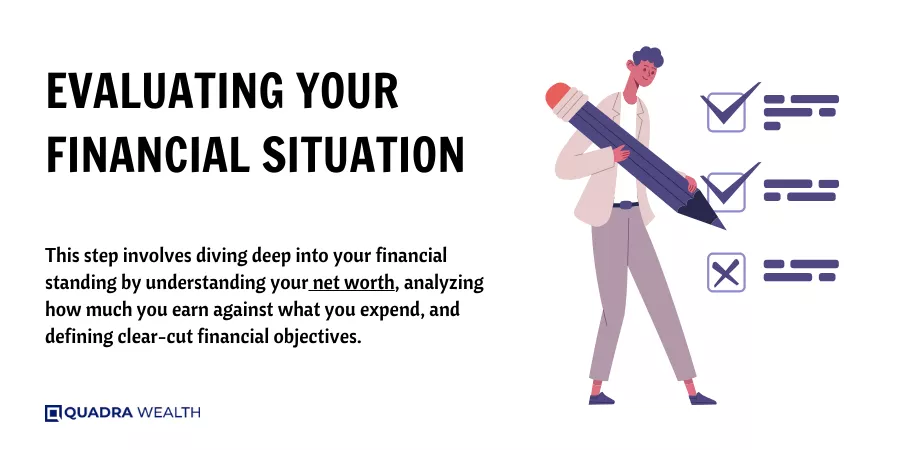Navigating your financial journey can often feel overwhelming and complex. Did you know there were approximately 330,300 personal financial advisors in the U.S. alone helping individuals manage their money? This blog post aims to demystify this subject by guiding you on when to consider hiring a financial advisor, outlining the types of advisors available, and offering tips on selecting one that aligns with your goals.
Let’s dive into securing your fiscal future!
Key takeaways
●Financial advisors help us manage and grow our money. They can guide us in smart saving, wise investing, budgeting, and paying off debts.
●There are different types of financial advisors. Some examples include registered representatives, wealth managers, financial planners, or robo-advisors. We need to pick the one that suits us best.
●Choosing a good advisor needs careful thought. It helps to ask them about fees, qualifications, and past work issues before hiring.
●A quality check on an advisor is needed too! Signs like high-pressure sales or unclear fee means we should not choose them as they might be bad at their job or worse — cheat money from us!
Evaluating Your Financial Situation
This step involves diving deep into your financial standing by understanding your net worth, analyzing how much you earn against what you expend, and defining clear-cut financial objectives.
Additionally, it’s crucial to discern the level of risk that you can comfortably handle in various investment scenarios.

Understanding Your Net Worth
Net worth is your total wealth. It is the sum of everything you own minus what you owe. A high net worth means good financial health.
This tells if you should save more or cut costs for retirement. Checking your net worth also helps to choose how to invest money wisely.
Events like getting married, having a baby or almost retiring mean that you must look at your net worth carefully as it can affect them all.
Analyzing Your Earnings and Expenditure
Keep track of your money. Write down all the money you make and spend every month. It helps to see where your money goes.
Maybe you buy a lot of snacks or games. It might be time to cut back on these. Think about things you need and things that just want.
Do you have enough cash after paying bills for food, home, and school? If not, try saving more or finding ways to earn more funds.
Stick with this plan till it works well for your financial situation.
Setting Your Financial Goals
Setting your financial goals is part of being money-smart. This means:
- Have a clear vision of what you wish. Maybe it’s buying a house, paying off student loans, or making a retirement plan.
- Put numbers into these plans. If you want to buy a house, find out the cost and how much you need to save each month.
- Write down long-term and short-term goals. Owning a house can be a long-term goal while paying off debt can be short-term.
- Find ways to meet these goals like using high-yield savings accounts or other investment opportunities.
- Check your progress often. Are you getting closer to your aim? If not, adjust your plan.
Identifying Your Risk Tolerance
Knowing how much risk you can take is called risk tolerance. This financial matters a lot in making investment plans. If you don’t like to lose money, then your risk tolerance is low. You will feel safer with bonds than stocks because they are less risky.
But if you’re okay with losing some money for a shot at big growth, then your risk tolerance is high. Stocks may be right for you since they can give big returns but also have big risks.
When to Consider Hiring a Financial Advisor
Looking for a financial advisor when you’re trying to achieve your financial goals, invest wisely, navigate major life events, or manage a lump sum of funds effectively.
Curious about attaining financial accountability or tackling debt efficiently? Dive in for more insights on how an advisor can shape your monetary future!

1. Achieving Financial Goals
A personal financial advisor can lead you to reach your money aims. They work with you on a plan to get the things that matter. A dream house, college for your kids, or a happy retirement, help make these real.
They use their know-how to find smart ways to save and grow funds for what you want.
For each goal, advisors find risks and deals in the market. They look at economic conditions like inflation too! This way, they can tell how much time and how much savings we need for our dreams.
With their help, setting aside money becomes easy and clear.
2. Investing Your Money Wisely
You need a smart plan to grow your money. Find a financial advisor he can help you with that. They can guide you in making the right picks and setting up a strong investment plan. Your savings could go into stocks, bonds, or mutual funds.
The goal is more growth over time. You might also look at risky choices like cryptocurrency, but they’re not for everyone. Online advisors often cost less and give the same good advice as in-person ones do.
Get help from an expert and make your money work harder!
3. Navigating Major Life Events
Major life events can change your financial situation fast. Think about a new marriage, or a baby on the way. Even hard times like a divorce weave into finances too. An advisor leads you through these changes smoothly.
If retirement is close, they help you prepare smartly. These experts know how to meet goals and avoid money strain during big financial life shifts. They also manage lump sums of funds from events like getting an inheritance wisely for you.
4. Managing a Lump Sum of Funds
Getting a large amount of money all at once can be exciting. But it’s also hard to know the best way to use it. This might happen after getting an inheritance, selling a house, or winning the lottery.
You need to think about taxes and make sure you don’t use all the cash too fast. A financial advisor can help with this issue. They have experience handling these types of funds and can offer smart tips on how to handle your lump sum effectively.
5. Need for Financial Accountability
A financial advisor helps us stay responsible with our money. They make sure we don’t spend too much or forget about our goals. They check on us and keep us focused.
We may want to buy a new car or go on a big trip. But an advisor will remind us of the bigger picture, such as saving for retirement or paying off debt first.
It’s key to have someone who can help guide these choices wisely.
6. Managing Debt Effectively
A financial advisor can be your secret helper while dealing with debt. They guide you in creating a strong plan to pay off your debts and show you different ways of budgeting.
By putting these steps into action, they assist in making sure that you’re not living paycheck to paycheck anymore.
This will allow you to save more money for other things like an emergency fund or a dream vacation trip! Plus, advisors can walk you through the pros and cons of debt-merging options, helping make it easier to deal with multiple creditor payments.
Finally, as part of their service, they prioritize which debt should be paid first based on the best interest rates; this allows better control over personal finances, all while holding people accountable for following their own plans!
Types of Financial Advisors
In this section, we delve into the different types of financial advisors available – registered representatives, registered investment advisors, wealth managers, and robo-advisors – each serving distinct roles and offering unique services to fit your specific needs.

Registered Representatives
Registered Representatives are a kind of money helper. They must obey the rules to sell stocks or bonds in your area.
Often, their pay comes from how much they care for or manage. Most times, this financial advisor cost is about one percent of what you give them to oversee.
However, with Robo-advisors, these costs are greatly cut down by half! Registered Representatives also make plans at an average fee of $2,000 or charge each hour around $250.
Registered Investment Advisors
Registered Investment Advisors, or RIAs, help you choose a financial advisor manage your money. They look at what you have and give investment advice on where to put it.
Flat fees, hourly rates, and fees based on how much money is in your account are all ways they might charge for their work. An RIA follows rules that make sure they act in a way that benefits you most.
This means telling the truth about costs and any gains. It also means picking choices that work best for you instead of ones that will earn you more money.
They can save time by choosing investment options without needing to ask first and take care of things like selling off investments before big tax charges come due.
Financial Planners
Financial Planners can help you see the big picture. They look at all parts of your money life. This includes things like savings, investments, taxes, and insurance.
They tie them all together into a plan to reach your goals.
Some Financial Planners have special training and get a certificate for it. The United States has about 330,300 of these skilled helpers ready to give advice on long-term plans and financial choices!
Wealth Managers
A Wealth manager plays a big role in finance. Financial advisor help people manage who have lots of money. These helpers create plans for you to grow your wealth even more.
They study how much risk you can take and use this information to invest your money wisely. With their help, you can buy stocks, bonds, or other assets that will make more money in the future.
Not just that, they are also helpful when tax planning and giving advice on estates.
Robo-Advisors
Robo-advisors are a new kind of helper for your money. They work on the internet and never sleep! These automated advisors use smart programs called algorithms to kind of financial advice about how to invest your money.
This service is often cheaper than hiring a human advisor. For people with less cash or who like to leave things to the pros, robo-advisors are an excellent choice.

Deciding the Right Financial Advisor for You
Embarking on the journey of determining the right financial planning advisor for you involves understanding their role, asking insightful questions to potential advisors, being vigilant to any red flags indicative of deceit or incompetence, establishing a fair fee structure that aligns with your investment goals and conducting diligent research on prospective financial advisors.
Fiduciary financial advisors are legally bound to put your needs before their own. A professional financial who has a suitability requirement is legally bound to provide products that are suitable for your financial needs, but they may not be the very best for you.
That doesn’t mean somebody who upholds the suitability standard isn’t going to look out for you – but it does mean that the rules for those advisors are less stringent.
Registered investment advisors, investment advisor representatives, and certified financial planner™ all carry fiduciary-level responsibility. You can easily spot these titles on business cards, websites, and email signatures. Chartered retirement planning counselor and accredited investment fiduciary are other designations that indicate a fiduciary responsibility.
When choosing a financial advisor, think about what financial services you need. Are you seeking help with financial and retirement planning. Want a financial advisor to help you buy and sell investments? If it’s the former, you’d likely be better served by a fee-only financial advisor.
With the latter, a commission-based advisor could help you keep costs down by not charging for unneeded financial planning services.

Understanding the Role of a Financial Advisor
A financial advisor can help you make smart money choices. Their job is to give advice about ways to handle your cash. They do this by learning how much money you have now and what goals you want to reach in the future.
Some advisors will help set up a plan for big life events like buying a house or getting ready for when you stop working. Others may suggest where best to put your money so it can grow.
Many of them also look at how risky different choices might be before advising on which ones suit you best. Financial planning advisors are there to guard, grow, and guide your resources in the right way.

Questions to Ask a Potential Financial Advisor
Choosing the right advisor is a big step. You should feel good about it. Here are some questions to help you.
- What kind of fees do you charge for your service?
- Do you have the right papers that show you can do this job?
- Have you ever been in trouble for doing something wrong at work?
- How often will we meet or talk about my money?
- What kind of plans can you make for me?
- Can you give advice on saving money, paying loans, and preparing for retirement?
- Does any company pay you to sell their products?
- Will they still pay if I use them because of your advice?
- Can you help if there’s a life event like getting married or having a baby, losing a job, or getting hurt?
- If I get a lot of money at once (like from a sale, gift, or prize), how can you help me?
Identifying Red Flags in a Financial Advisor
Choosing the right Financial Advisor needs care. Watch for these danger signs:
- The advisor makes promises of high returns with low risk.
- They don’t communicate well or take time to answer your questions.
- They try to sell you financial products that you don’t need.
- They brush off debt problems instead of creating a plan to clear it off.
- The advisor does not hold any credentials or certifications like CFP.
- You find negative feedback about them on FINRA’s BrokerCheck tool.
- Their fee structure is vague and not clear.
- They do not ask about your financial goals and ignore your risk tolerance.
- Their approach doesn’t match with yours.
Determining a Fair Fee for a Financial Advisor
Knowing what you will pay your financial planning advisor helps. Hourly rates for these advisors usually sit at $250. Some may ask for a fixed fee. You might pay about $2,000 for this type of plan cost.
Often they charge assets under management (AUM) fees too. This is where the amount you pay links to how much money they handle for you. Generally, it will be around 1% of the total sum managed each year.
You can also opt to hire robo-advisors which are cheaper alternatives with fees from 0.25% to 0.5%. But remember, quality matters more than just low costs when managing your hard-earned money
Doing Your Own Research on Financial Advisors
You can find out a lot about financial advisors on your own. Here are some steps to help you:
- Start with the tools from the U.S. Security and Exchange Commission (SEC).
- Use the SEC’s Action Lookup Tool to check if an advisor faced any issues.
- Visit FINRA’s BrokerCheck tool to look at an advisor’s track record.
- The Financial Industry Regulatory Authority (FINRA) has info about past work problems for advisors.
- Ask around – friends and family might have good suggestions.
- Look at the National Association of Financial Advisors website for ideas.
- Check out websites like NerdWallet for reviews and more information.
- Do not forget to check what clients say online about them.
- Look at their service fees and how they get paid.
- Last, set up a meeting with each one you like best.
Frequently Asked Questions about Financial Advisors
Many people have questions about financial advisors. Here are some common ones:
Ask a financial advisor what does he do?
A financial advisor helps with tasks like long-term financial planning, managing investments, and major life events.
Do you need to be rich to hire a financial advisor/ financial planner?
No. You don’t need to be wealthy to seek comprehensive financial planning advice from a financial advisor.
How many personal financial advisors are there in the U.S.?
There are about 330,300 personal financial advisors in the U.S. in 2021.
What different areas do they specialize in?
Financial advisors offer many services and each one can focus on different areas.
What things should I think about when deciding if I need one?
You should look at your money situation, set money goals, and understand how much risk you can handle.
Will a financial advisor understand my specific needs and any fees I might have to pay?
Yes, it’s important to pick a financial advisor who knows your needs and tells you about all fees or commissions.
Pros and Cons of Hiring a Financial Advisor
Hiring a financial advisor comes with its own set of benefits and drawbacks. Understanding these pros and cons can help make an informed decision on the need an advisor and impact of their services.
- Financial advisors can help in achieving financial goals by providing a comprehensive plan.
- They provide valuable assistance in managing your investment portfolio and recommending investment opportunities based on your risk tolerance.
- Advisors offer guidance during major life events like marriage, having a baby, or nearing retirement, helping navigate the complex financial .
- They provide assistance in managing debt effectively and creating a debt repayment strategy.
- A financial advisor can manage a lump sum of funds, such as an inheritance, ensuring it is invested wisely.
- Advisors can provide financial advice, keeping track of spending, savings, and investments.
- Some financial advisors may charge high fees for their services, impacting overall returns.
- Finding the right financial advisor who aligns with your financial objectives can be a challenging task.
- There could be a potential conflict of interest if the advisor is not fiduciary, pushing products for commissions rather than considering the client's interest.
- Not all financial advisor may be able to have the same level of expertise or experience, which can impact the quality of advice.
- Some people might feel uncomfortable disclosing detailed personal financial information to an advisor.
- One may not need a financial advisor if they have a simple financial situation or the capability to manage finances independently.
Conclusion
Take time to hire the best financial planners who is skilled. A good one will help you reach your money goals. You can map out a clear future with their help.
Start today and let a financial advisor guide you on the path to success.
FAQs
A financial adviser offers Financial Advice and helps you with investments, expenses, tax planning, estate planning, and other finance issues.
You can use tools like SEC’s Action Lookup tool or FINRA’s BrokerCheck to find out more about your local financial advisor online one such as Vanguard Personal Advisor Services.
In a fee-only system, advisors get paid by their clients only for giving advice on finances and investment management and financial planning without extra cost from selling securities or other investments.
Yes, it does! A CFP follows high fiduciary standards set by the National Financial Educators Council to help manage tasks like budgeting or creating debt payoff strategic financial planning.
Absolutely yes! Besides making financial decisions, they also handle retirement plans, and tax-efficient accounts and give guidance related to life insurance products if needed.
Of course! You must think about things like compensation structure along with fees charged against account minimums managed in addition to considering the client profile they focus on.

Why You Need a Personal Financial Manager?
Personal finance management (PFM) is not confined to budgeting and investment any longer. There are

Nearing Retirement Advice for a Secure Future
Nearing retirement advice? A plan for retirement is essential to enjoy a happy healthy life

What is Debt Ceiling? A Complete Guide for Beginners
What is Debt Ceiling? Debt Ceiling, also known as the debt limit, is the highest

Is It Possible to Have No Debt?
Debt is often considered the norm in the corporate world, but the debt free companies





